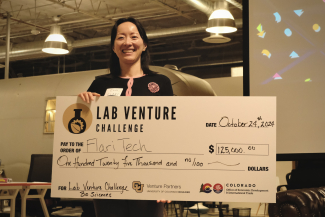Flari Tech Inc., a startup rooted in cutting-edge JILA research, has clinched one of the prestigious 2024 Lab Venture Challenge (LVC) grants from the University of Colorado Boulder, advancing its pioneering work to build a breathalyzer for diagnostics use targeting life-threatening diseases such as lung cancer.
Developed at JILA by a team led by JILA and NIST Fellow and CU Boulder Physics professor Jun Ye and JILA graduate students Qizhong Liang and Apoorva Bisht, Flari Tech’s innovative diagnostic tool is powered by the Nobel Prize-winning optical frequency comb, and aims to bring a novel, non-invasive, faster method for lung cancer detection for clinical use.
“This win validates both the importance of our work and the rigorous science behind it,” said Eva Yao, Flari’s CEO. “The LVC award strengthens our confidence, showing that the reviewers recognize our technology’s potential impact in the biomedical field.”
The LVC is CU Boulder’s premier entrepreneurial competition for deep tech, drawing innovative teams from across CU Boulder, Denver, and Colorado Springs to compete for a share of $1.25 million in startup funding. The program, run by Venture Partners at CU Boulder, supports projects that address critical commercial needs with high scientific merit and a promising path to market.
In this year’s competition, fourteen teams presented their technologies to judges from CU Boulder’s entrepreneurial network, giving Shark Tank-style pitches across two sessions focused on biosciences and physical sciences/engineering.
Flari Tech’s laser-based breathalyzer technology, developed at JILA by a team led by Professor Ye, is engineered to detect small molecules in exhaled breath rapidly and accurately. By creating a clinically useful, highly sensitive detection tool for lung cancer, Yao and the team aim to help patients and their providers catch and manage lung cancer at its earliest stages.
“At its core, the breathalyzer is an application of cutting-edge physics research applied to the biomedical field—a direct link between JILA’s scientific advancements and the potential for real-world impact in healthcare,” Yao explained.
Funding from the LVC will support Flari Tech’s clinical studies at the Anschutz Medical Campus, where the team will work with its clinical partners to identify potential biomarker candidates for lung cancer.
“This grant allows us to move the needle in our clinical work, supporting research personnel on both campuses for our studies,” Yao said. “To see an initial idea progress to this stage, with support from both CU Boulder and Anschutz, is exhilarating.”
Yao, who was introduced to Ye and his team through the Embark Deep Tech Startup Creator program, noted the profound significance of working with technology that originated from JILA’s expertise in optical physics.
“It’s exciting to apply JILA’s Nobel-level optical physics research to a new field,” she said. “We’re blending fundamental science with patient-focused solutions. This application of optical frequency combs—typically used in physics and astronomy—is now helping shape the future of healthcare.”
Written by Kenna Hughes-Castleberry, JILA Science Communicator



 The Physics Frontiers Centers (PFC) program supports university-based centers and institutes where the collective efforts of a larger group of individuals can enable transformational advances in the most promising research areas. The program is designed to foster major breakthroughs at the intellectual frontiers of physics by providing needed resources such as combinations of talents, skills, disciplines, and/or specialized infrastructure, not usually available to individual investigators or small groups, in an environment in which the collective efforts of the larger group can be shown to be seminal to promoting significant progress in the science and the education of students. PFCs also include creative, substantive activities aimed at enhancing education, broadening participation of traditionally underrepresented groups, and outreach to the scientific community and general public.
The Physics Frontiers Centers (PFC) program supports university-based centers and institutes where the collective efforts of a larger group of individuals can enable transformational advances in the most promising research areas. The program is designed to foster major breakthroughs at the intellectual frontiers of physics by providing needed resources such as combinations of talents, skills, disciplines, and/or specialized infrastructure, not usually available to individual investigators or small groups, in an environment in which the collective efforts of the larger group can be shown to be seminal to promoting significant progress in the science and the education of students. PFCs also include creative, substantive activities aimed at enhancing education, broadening participation of traditionally underrepresented groups, and outreach to the scientific community and general public.